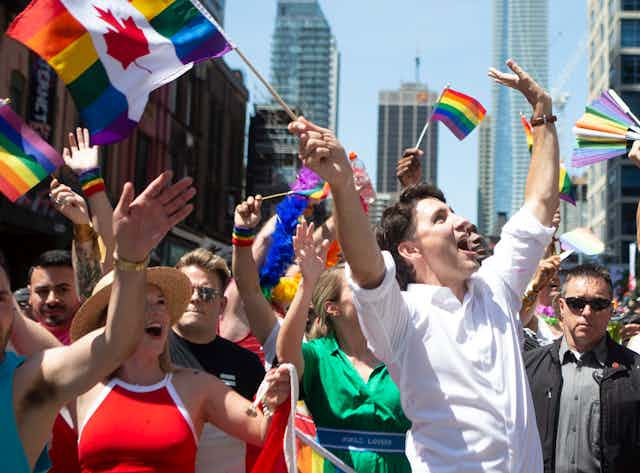Pride parades were established to commemorate the strife experienced by gay men, lesbians, bisexuals and trans people at the 1969 Stonewall Riots in New York City’s West Village. Parades worked their way into Canada to help celebrate queer life across two-spirit, lesbian, gay, bisexual, trans, queer, intersex and asexual (2SLGBTQIA+) communities and ignite social change.
Since then, Pride has grown into a month-long event, celebrating the strength and determination of these communities. And for many cities, 2022 marks the first in-person Pride since the pandemic began.
As excitement ramps up for the month’s events, it’s essential to acknowledge that the 2SLGBTQIA+ community is not lacking in conflict and contradiction. Pride festivals have been criticized for erasing the way queer events and non-profits thrive off of and normalize capitalism, white supremacy and settler colonialism.
For example, Pride Toronto has been widely criticized by Black, Indigenous and racialized communities for allowing police to carry firearms and attend events in uniform, for creating a land acknowledgement that failed to recognize Indigenous people and for mishandling grant funding that ended up exploiting Indigenous and two-spirit artists.
While a lot of criticism is directed at Toronto Pride, less attention is given to the ways queer organizations and their workers engage in exclusionary practices.
Exclusionary practices at queer organizations
In Toronto, many queer organizations — like those that operate in health care, education and social services — also emerged in the 1970s. And many have evolved into community hubs to address and support the overall health and well-being of 2SLGBTQIA+ people.
In my recently published book, Queer Professionals and Settler Colonialism: Engaging Decolonial Thought Within Organizations, I utilize critical whiteness studies, critical Indigenous studies and queer studies to address the ways non-Indigenous LGBTQIA+ workers (like administrators, front-line workers, counsellors and public health workers) can support Indigenous Peoples’ calls to meaningfully decolonize.
I found that tropes of diversity and inclusion impact the ways queer organizations operate. Organizations often claim they accept all gender identities, expressions, sexual orientations and races but, in reality, participate in exclusionary practices.
When working in queer organizations, as a white, queer, cisgender-passing settler, I aligned my care work in a way that normalizes identity and presumes that those seeking help have experienced similar traumatic experiences to my own. But in reality, people’s experiences are complex and multifacted, and the experiences of racialized queer people are often inadequately addressed.
Because of this, the work of racialized queer people seeks to transform queer organizations to challenge everyday forms of racism and dispute the presumption that queerness is a white thing.
In my earlier research that looked at the ways racism and settler colonialism shape queer organizing in Toronto, I worked with two-spirit Indigenous people within queer organizations and many Indigenous colleagues and mentors encouraged me to “work within my community.” So as a qualitative researcher, I decided to turn my ethnographic gaze onto whiteness.
By examining queer organizations, I sought to understand the ways white workers imagined their work, roles and responsibilities when delivering services to Indigenous people and engaging in forms of decolonization within queer communities.
My research works to challenge the whiteness of queer organizations.
Examining whiteness and settler colonialism
My research has shown me that the system is incredibly broken, especially given that anti-Black and anti-Indigenous racism has made its way into social work and other helping professions. Little, if any research, examines the role of white LGBTQIA+ workers in how they work against whiteness and settler colonialism within their respective organizations.
Given the power of whiteness within queer organizations, many white workers failed to see how their everyday action and inaction reinforced the marginalization of Indigenous people. Some examples include, misrepresenting two-spirited people on event posters, including a hollow land acknowledgement at the beginning of community conferences and failing to ensure trauma-informed care addresses anti-Indigenous racism and settler colonialism.
Queer organizations continue to perpetuate harm through their mission statements and funding sources. Prioritizing Indigenous Peoples’ self-determination and sovereignty is low on their list of priorities.
Many queer organizations in the city tend to place advocacy and social change within professional and ethical mandates of cultural competency and oppression. These theories of practice often don’t adequately address pervasive and long-standing oppression faced by Indigenous people.

Questions to ask your queer organization
Queer organizations, in their current form, may not be able to adequately address the structural dynamics of whiteness and settler colonialism. But it would be unhelpful to suggest that these organizations should be done away entirely.
If you are working within an organization, a community organizer or an advocate, you may want to ask yourself the following questions to begin the process of engaging in decolonization:
What organizations are already supporting Indigenous people? How can your organization help uplift these existing services and supports?
In what ways are organizations safe, inclusive and inviting to Indigenous people? How can your organization foster a safe space for Indigenous people to request services, support and care?
How are Indigenous people, perspectives and ways of knowing incorporated into your organization? Have Indigenous people voiced the need for specific services and support that you’re not yet addressing?
Decolonial work is needed and necessary. Queer people, communities and organizations have a responsibility to work toward undoing historical and contemporary wrongs. While Black, Indigenous and racialized people are forming coalitions to challenge racism, white people need to step up and take action to challenge the white settler colonialism from which they benefit.

